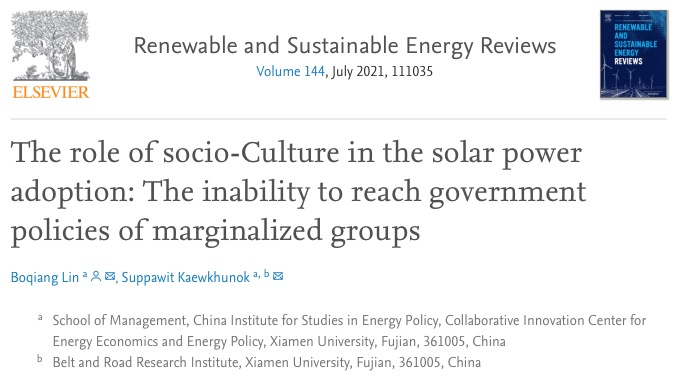
题目:社会文化在采用太阳能发电中的作用:无法达到边缘化群体的政府政策(The role of socio-Culture in the solar power adoption: The inability to reach government policies of marginalized groups)
作者:林伯强*,Suppawit Kaewkhunok*
期刊:可再生和可持续能源评论(Renewable and Sustainable Energy Reviews)
详细:144卷,2021年7月
DOI:https://doi.org/10.1016/j.rser.2021.111035
文献导读:
联合国成员国共同通过了2015年-2030年可持续发展目标,其中第7条旨在促进人们获得廉价、清洁、现代、稳定和可靠的能源。但在全球范围内,超过11亿人无法使用电力,28亿人负担不起清洁的烹饪设施。这是包括尼泊尔在内的发展中国家面临的重大挑战,尼泊尔政府以多种形式增加国内电力供应,特别是促进和支持可再生能源的定向补贴。尽管这些政策发挥了重要作用,但许多家庭仍然受到清洁能源缺乏的困扰。
传统经济理论认为,家庭做能源使用决策时始终比较成本和收益,贫困家庭只有在政府支持和财政援助下才会接受现代能源技术。但实际并非如此,许多家庭接受现代能源技术的决定是不符合经济理性的,解释这些行为模式,在评估和分析地方政府政策的执行情况方面发挥着至关重要的作用。
本文旨在探究社会文化因素在能源使用决策中的作用,文章评估了尼泊尔家庭采用太阳能发电技术中种族种姓因素的影响。文章认为在推行可再生能源政策时,决策者和研究人员需要更加关注这些社会文化因素。
Abstract: Renewable energy is one of the key policies of many developing countries to strengthen rural people's access to electricity and not connect to the national grid. However, the determination of the decision to accept renewable energy technologies still lacks a clear understanding. Estimating a cross-sectional survey, this study analyzed the impact of the ethnic-caste factor on the adoption of solar power technology in Nepal. The results reveal that Dalit and Madhesi households that are the lowest caste and marginalized ethnic group within Nepal society were about 36.3% and 79.8% less likely to adopt solar power technology compared to the high caste households, respectively. Using propensity score matching to deal with bias and inconsistent estimates, the results confirm the impact of the ethnic-caste system on solar power technology adoption. The findings reflect that aside from the economic variables that play a role in determining the adoption of renewable energy technologies, social and cultural factors are also significant. The main policy implication is that policymakers should consider a holistic approach to renewable energy policy design, especially the socio-cultural factor priorities, to increase the opportunities for government policy access among marginalized groups.
Keywords: diffusion of innovations; ethnic-caste system; Nepal; solar power
 厦大总机:0592-2180000
|
地址:福建省厦门市思明区思明南路422号
|
邮政编码:361005
厦大总机:0592-2180000
|
地址:福建省厦门市思明区思明南路422号
|
邮政编码:361005